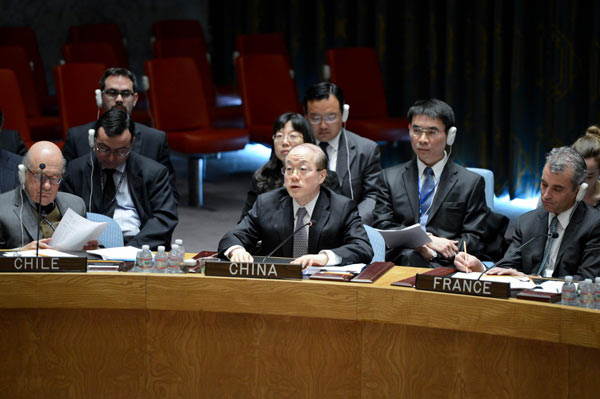

|
 |
|
Liu Jieyi, China's representative to the UN, delivers a speech at a UN Security Council open debate, Jan 29, 2014. [Photo/Xinhua] |
UNITED NATIONS - China, South Korea and the Democratic People's Republic of Korea (DPRK) blasted Japanese Prime Minister Shinzo Abe's recent visit to the notorious Yasukuni Shrine at a UN Security Council open debate on Wednesday.
UN Undersecretary-General for Political Affairs Jeffrey Feltman led the debate on "War, its lessons, and the search for a permanent peace," saying that the end of fighting does not necessarily mean peace begins.
Liu Jieyi, China's representative to the UN, recalled Japanese Prime Minister Shinzo Abe's recent visit to the Yasukuni Shrine, which was a symbol of Japan's wartime militarism as 14 civicted class-A WWI war criminals were enshrined there.
"In defiance of the strong opposition by the international community," Abe paid homage "to those who launched the war of aggression and were up to their elbows with the blood of the people in the countries they invaded" during World War II, Liu said, calling the shrine "a spiritual tool and symbolism of Japanese military aggression."
"Abe's homage to those fascist war criminals are nothing less than a challenge to the victorious outcome of the war against fascism and a challenge to the post-war international order based on the UN Charter," Liu said. "What Abe is doing is trying to reverse the verdict on the war and defend war criminals. They will never be accepted by people with conscience nor by justice-upholding countries."
"Nobody can go against the current of history," the Chinese ambassador said. "Any act to deny or refuse to reflect on the history of aggression, to negate the people of the world against fascism, to challenge the principles and purposes of the UN Charter will be in vain and will be discarded by history."
Ambassador Oh Joon of South Korea agreed. "This debate enables us to reflect anew on the scourge of past conflicts and lessons learned," he told the council. "We would also like to seek ways to prevent conflicts and consolidate peace for future generations."
"Unfortunately, tensions are escalating more than ever before due to the distrust among states in Northeast Asia," he said. "Many Japanese leaders have continuously shown an attitude of historical revisionism, by paying tribute to the Yasukuni shrine, where its past history of aggression is glorified."
He also criticized Japan for presenting "distorted historical views to its next generation through revised teaching manuals for school textbooks."
The deputy permanent representative of the DPRK joined in the criticism of Japan.
"The DPRK insists that the UN should pay due attention to and make every effort to the issue of outstanding crimes against humanity committed during World War II," said Ambassador RI Tong Il.
"The past crimes committed by Japan against the people of Korea, against the people of China, against the people of the Southeast Asian countries cannot be found in its precedence in the history of mankind, in its degree of its savageness and brutality and it is the common issue which does not belong to only Asian countries; it is an issue belonging to entire humanity," said Ri.